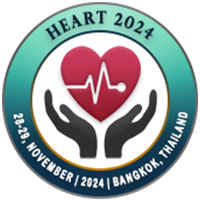
Dr. Ayesha Tariq
, King Edward Medical University, PakistanTitle : Influence of BMI on outcome if patients undergoing PCI during 24hours of hospital stay
Abstract
The influence of obesity on the outcome of coronary interventions is unclear and researchers have reported ‘obesity paradox’. This study was conducted to see the frequency of complications after coronary intervention among patients with different body mass indices during first day of post procedure hospital stay. Three hundred and thirty-five patients who underwent percutaneous coronary intervention (PCI) were enrolled. The height and weight of enrolled subjects were measured and body mass index (BMI) calculated. The patients were grouped into 3 groups: Group A - BMI < 24.9, Group B - BMI 25-30 and Group C - BMI > 30. The patients were monitored for major bleeding, myocardial infarction and mortality for 24 hours after PCI. There were 72 patients in Group A, 141 in Group B and 122 in Group C. Bleeding complications (gum bleed, puncture site hematoma) and anginal symptoms were comparable in all the three groups. Two patients presented with acute stent thrombosis; one each in group A (1.4%) and group B (0.7%). Mortality occurred in 2 patients; one each in group A (1.4%) and group C (0.8%). These observations showed no statistically important difference among 3 BMI groups. To conclude, obese, overweight and normal weight patients undergoing percutaneous coronary intervention had similar outcomes during initial 24 hours with non-significant increase in complications in normal weight individuals.
Biography
Dr. Ayesha Tariq has completed his FCPS in Cardiology at the age of 33 years from College of Physicians and Surgeons Pakistan after being trained at Punjab Institute of Cardiology Lahore, Pakistan. She is currently working as Assistant Professor of Cardiology at King Edward Medical University Lahore, Pakistan. She is actively involved in clinical, interventional and research work. Her area of interest in research is coronary intervention.

